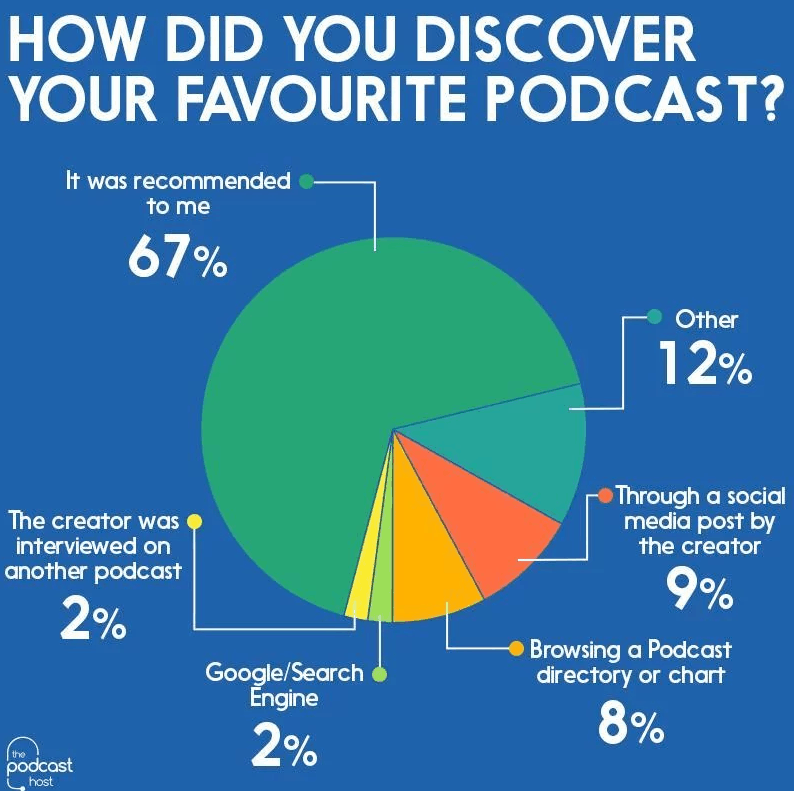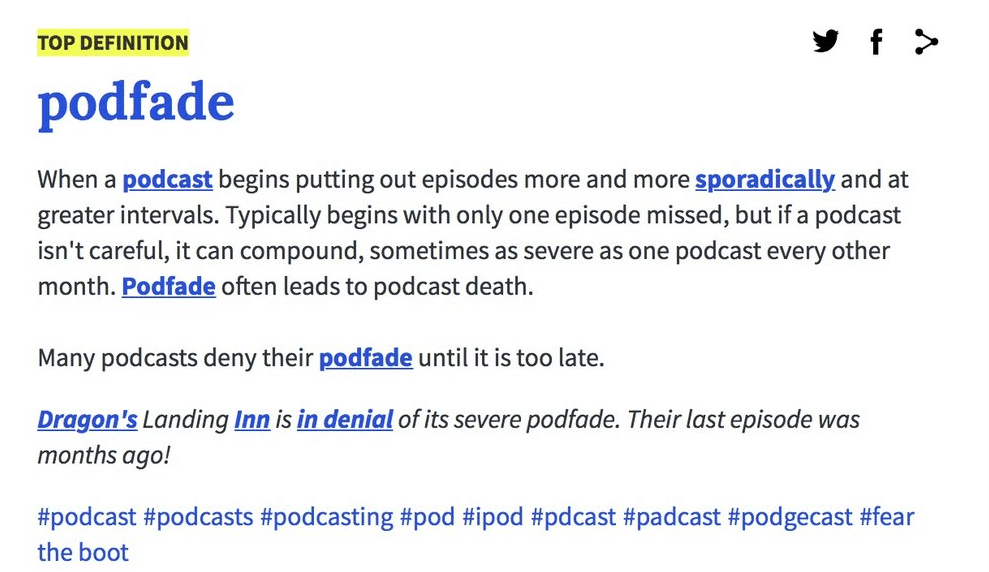In this article, we’re going over the benefits of consistently publishing podcast episodes. We’re breaking down why it’s so important to stick to a schedule and how reliably releasing new content will help set your listener’s expectations. If you’re unsure how consistently publishing a podcast supports growth, stick around for our top four reasons why it’s important and what to do if you’re struggling to make it work.
Imagine you sit down to watch your favorite TV show. You waited all week for the next episode. You settle in with your bowl of popcorn, ready to be rewarded for your patience.
But it’s not available! The new episode is due, but it hasn’t been published. There’s no word from the show’s creators. Was it canceled? Was it moved to another time?
This kind of inconsistency damages your relationship with the show’s creators. If you can’t depend on it, you may not give it your time at all. Podcast listeners are exactly the same. They want reliability. They want new content released on a timely schedule they can depend on.
Why Consistently Publishing Podcast Episodes Is Important
We see a lot of great podcasts struggle because the creators fail to publish new content on a consistent schedule. What should be a great show never seems to take off because listeners don’t know when the next episode will appear. Here are four reasons why consistently publishing your podcast is important.
1. Consistency creates engagement
An engaged listener is one who looks forward to every new episode. They follow your social media profiles, read your newsletter, and connect with other fans. They support you with their feedback and encouragement. They share about your show and help you attract new listeners.
Recommendations, by the way, are the top way people discover podcasts.

In this sense, you and listeners make up a partnership. You create the content and your listeners will help your show grow. Engaged listeners are your most valuable assets in that partnership.
But your listeners won’t stick around if you fail to hold up your end of the bargain by releasing regular content they enjoy. If they grow frustrated by your haphazard schedule or feel like you don’t respect their time, they’ll find some other podcaster who rewards them for their engagement.
If you want your listeners to invest their time and energy into your podcast, it’s critical that you meet your obligations. If you promise one episode each week, do whatever it takes to deliver a new episode each week. Over time, your listeners will grow to trust your reliability and pay you back with their engagement.
2. Listeners will fold you into their routine
Have you ever adjusted your schedule to fit in a piece of content? Maybe you put the kids to bed early on Sundays to watch Game of Thrones. Maybe you stay up a little later on Wednesdays to watch your favorite livestreamer. Or maybe you take the long way to work on Fridays so you have time to listen to the newest episode of your favorite podcast.
If so, you aren’t alone. A lot of us build our routines around our favorite bits of content. We do it so we get our fix right away and don’t fall too far behind.
We also do it to maximize our personal enjoyment. If you save your favorite podcast for your morning commute, you get to enjoy your hobby without sacrificing evening family time or staying up late. Everybody wins with a little foresight and optimization.
Now, imagine one of your listeners tries to download your newest episode as he steps on the treadmill, only to learn that you haven’t published on time. Not only will he have to find a new podcast for his workout, he may look for more reliable shows to fill his time.
When you publish your podcast episodes consistently, you give your listeners the power to build your show into their lives. But if you aren’t dependable, they won’t adjustments to fit your show into their schedule. They will look for another podcaster who accommodates their lives better.
3. People love binge-able libraries
These days, we like to binge on new content. When we find something new, we want to explore a lot of it. We aren’t willing to wait for the next installment unless we are already invested in it.
Netflix knows this. They release entire seasons of new TV shows all at once so fans can binge. Yes, there is a break between seasons, but that’s easier to endure than a delay between every episode.
As a podcaster, you can’t release an entire year’s worth of content at one time. That just isn’t feasible. So it’s important to build up a library of episodes as quickly as you can so new listeners have plenty of content to explore.
This is why we always tell new podcasters to wait to publish until they have three or four episodes ready. It’s a critical way to promote your podcast.
Your longtime listeners will wait for each new episode. They will use that time to engage with you in other ways, like through your social media pages, your podcast community, or your podcast website comments.
But new listeners need a bank of content to binge at once. Publishing consistently is a key way to build that binge-able bank of episodes. Keep plugging along so your new listeners have plenty of content to enjoy and decide to follow you for new episodes.
4. Consistency helps prevent podfading
You’ve probably heard the word “podfading” before. It’s a common subject in our Podcast Hackers Facebook group. Podfading refers to the tendency to “fade away” from podcasting over time by waiting longer and longer to release episodes until you eventually stop altogether.
Podcasters podfade for a number of reasons. Some find podcasting too difficult. Some get busy with family or work obligations. Others slowly decide that podcasting isn’t right for them.
But the biggest reason people pod fade is due to lack of growth. They grow frustrated because their show doesn’t perform as well as they would like. Overtime, their frustration leads them to publish less consistently, which just exacerbates the problem.
Publishing consistently helps prevent podfading in two ways:
First, it makes the process of podcasting more manageable. A consistent schedule means you can plan your work ahead of time and work at a reasonable pace. You won’t need to stay up late to finish your recording or stressfully complete your edits while you make dinner for your kids.
Second, publishing consistently makes your show grow quicker. It’s much easier to find the motivation to publish on time when you have fans who depend on you. A show that grows quickly is a show that makes money quickly. Income from your podcast will simplify a lot of challenges.
What If You Can’t Consistently Publish Podcast Content?
Okay, so you understand the benefits of consistent publishing podcast episodes, but what if you struggle to make it work? If that sounds like you, you aren’t alone. Podcasting takes more of a time investment than other forms of content creation. A lot of new podcasters underestimate how much time it takes to design, produce, and publish an episode.
Use these simple strategies if you can’t publish consistently.
1. Publish less frequently
This may feel like admitting defeat, but that isn’t the case. It’s better to publish less often on a consistent schedule than to publish more often on a sporadic schedule.
Scale back your production schedule to give yourself more breathing room. Instead of publishing every week, shoot for twice a month or even once a month. You can always increase your publishing schedule later.
2. Record episodes in batches
One of the best ways to boost your productivity when you produce episodes is to record them in batches. Essentially, this is when you designate a block of time for recording multiple episodes. Some veteran podcasters can record four or five episodes in a single day, which provides them with enough content for a whole month.
3. Weave in easier episodes
If your episodes are difficult to produce in a reasonable amount of time, consider recording an easier episode from time-to-time to lighten your load. For instance, if you like to host interviews with a panel people, maybe every third episode could be an interview with one person because that’s easier to coordinate and edit. Or maybe every fourth episode is a solo monologue.
4. Notify your fans of absences
If you absolutely can’t publish an episode on time, it’s important to let your fans know. Take advantage of your podcast website, social media channels, and email list. Tell your fans why you’ll miss the usual publishing time (you don’t have to give too many details here, but be honest with them) and when they can expect the next episode.
This is very important: If you promise to publish late, you must hit that new target. Your fans will forgive you for disappointing them once, but they’ll grow annoyed if you do it twice.
Summary
If you are having a hard time publishing consistently, or if you are new to podcasting and worried about committing to a podcast schedule, we strongly recommend creating your own podcast editorial calendar.
A calendar gives you a big picture view of your production process and makes you consistent by making you aware of what’s due, what’s coming up next, and who’s responsible for it. Add dates to each deliverable for each episode to keep you on track.
You can keep things organized with a project management tool, but most podcasters can get by with a simple tool like Google Calendar. A cloud-based tool is especially important if you work on a team with other people who need to be informed as well.
Action
Read to start your own podcast? Learn the nitty-gritty details of starting your own show in our comprehensive guide. Learn how to start a podcast.



